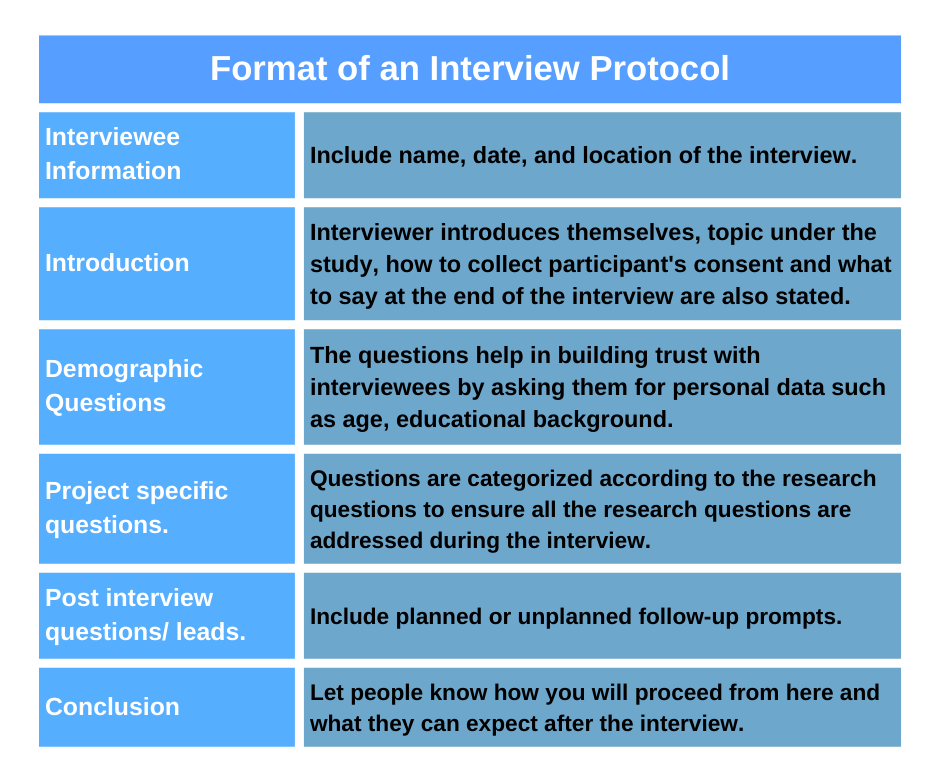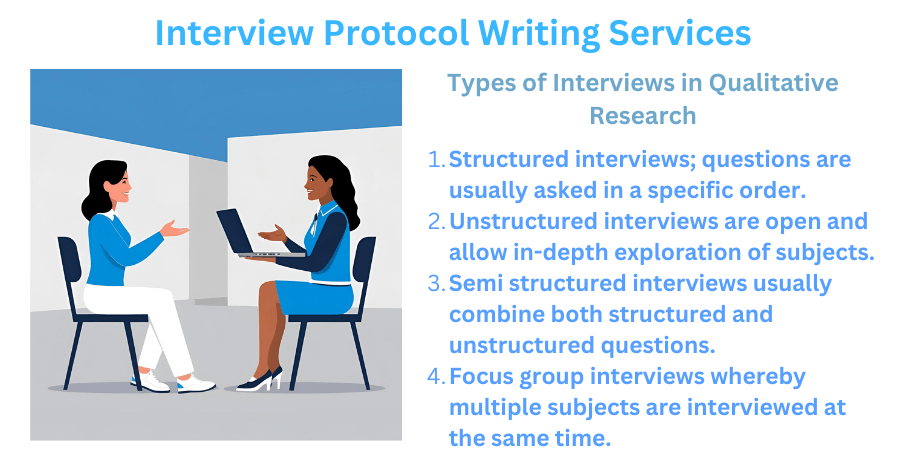Factors We Consider When Writing an Interview Protocol for Qualitative Research
Our excellent interview protocol writing services help researchers systematically organize the process of eliciting detailed qualitative data from participants to understand their experiences and perceptions. Writing interview protocols is imperative for researchers before conducting qualitative research methods such as phenomenology, grounded theory, case studies, and ethnography.
Whether structured or semi-structured interviews are to be used, protocols are necessary to guide the process and aid in compiling a qualitative report for the study. The scope of our interview guides writing services ranges from those of research proposals, theses, dissertations, capstone projects, and other student papers.
We write protocols that are focused on the conditions that aid in an excellent interview process such as accessing and selecting participants, creating trust and rapport, location and duration for the session, order, clarity, and quality of interview questions.
In this article, we have outlined the various factors that we consider when writing protocols for both semi-structured and structured interviews in qualitative research. We ensure that the client gets the best interview protocol writing help by considering the following factors.
1. The interview questions format suitable for the qualitative research
The format and number of research questions depend on whether one is planning to conduct a structured or semi-structured interview. A semi-structured interview may require fewer open-ended questions than a structured one. The number should be logical to allow enough time for participants to answer questions freely and elaborate their responses. Having a rational number of questions also allow the interviewer to ask follow-up questions for upgraded answers.
2. The interview script for opening and closing the session
Interview scripts help in preparing the type of information that the researcher should share with the subjects. The script acts as an interview guide for sections that are not catered for in the research questions. It allows the interviewer to tell the participants about themselves, what they are studying, and the justification for the inquiry.
The script also provides important details about informed consent and allows participants to share any additional thoughts that may not have been discussed during the interview. Our interview protocol writers ensure conciseness and clarity for effective communication between researchers and their study subjects.
3. Informed consent for participants
Before starting the interview, the study subjects must be provided with a participation sheet and an informed consent form to read, fill in relevant information, and sign to accept being part of the process. We write superb interview guides and protocols for qualitative research papers, dissertations, theses, capstone projects, and any other assignments for our clients, with a clear explanation of how informed consent was obtained from participants.
4. Use of open-ended questions
Whether writing a thesis, capstone project, or a dissertation interview protocol, open-ended questions are important to encourage descriptive answers through which a qualitative researcher can unravel more information about the participants, their situations, and how they perceive life experiences.
Our interview protocol writing services, therefore, help in creating open-ended questions that can elicit as much information as possible from the participants and lead to the accomplishment of qualitative research objectives.
5. Organization and question order in the interview protocol
When conducting interviews, it is prudent to start by asking basic questions to build rapport with the interviewee. Asking background information before focusing on a particular topic helps the interviewer and the participant to have an open conversation throughout the session.
Those who purchase an interview protocol for qualitative research from our credible company are assured of perfectly organized and ordered questions, beginning with the basic and easy-to-answer to difficult or controversial ones.
6. Use of prompts and leading questions
Open-ended questions are aimed at triggering descriptive answers from interviewees and eliciting intense qualitative information pertaining to their experiences and perceptions. A prompt can be an effective discussion guide that leads the participant when answering the open-ended questions.
Prompts also act as reminders to researchers that unexpected data might emerge during the interview. When designing the interview protocols for qualitative research, broad questions that can be answered from different perspectives are encouraged to prompt the respondents into giving more specific information to enrich the study.
7. Provision for revising protocols during research
When conducting interviews, follow-up questions may emerge. It may, therefore, be necessary to re-order the interview questions depending on the direction and perspective of the participant responses.
Emerging questions tend to arise, especially when the interview flows like a natural conversation. Where applicable, the new order of questions can be adopted for future studies and the interview protocol can be adjusted accordingly.
8. Time required for the interview
Interview protocols in qualitative research should specify the average timeframe required to administer the questions and receive responses from participants. Making long interview sessions may cause respondents to resist the process.
Offering the best interview protocol writing help to our clients is a priority, ensuring a rational number of questions that will not consume much of the participants’ time. The time taken is also influenced by who is being interviewed and their health conditions.
9. Relationship between interview and research questions
Interview questions must align with the research queries to facilitate utility throughout the process. The main aim of conducting interviews is to gain an understanding of other people's experiences and perceptions.
Given the complexity and diversity of people's life experiences, it is fundamental to evaluate the interview questions before using them for data collection. The questions should help the participants to describe their stories while remaining relevant to the study objectives.
10. The ability of the interview protocol to promote inquiry-based conversation
Interview questions should sound like people naturally talking and conversing with each other. We write protocols that promote conversation by creating interview questions that are functionally distinguishable from research questions. The script part of an interview protocol guides the development of an inquiry based conversation and helps transition from one topic or set of questions to another.
11. Mechanics of style
Mechanics of style are essential considerations in writing interview protocols for qualitative research because they facilitate clarity of communication. After ordering our interview protocol writing services, one should rest assured of perfect punctuation, spelling, capitalization, appropriate use of italics, abbreviation, and numbers among other stylistic features.
12. Grammar and usage
Based on the understanding that incorrect grammar and poor syntax impede effective communication, our writers ensure the correct use of verbs, nouns, pronouns, and other elements to facilitate perfect sentence construction. The questions and interview guides presented in the protocol must be grammatically correct for effective communication between the researcher and the participants.
13. Continuity and flow
Our experts provide the best interview protocol writing help by ensuring continuity and flow throughout the document. Proper transition between main questions, follow-up questions, and prompts aids in achieving the inquiry-based conversation that flows as though the participants and the researcher were talking naturally.
We write with conciseness and clarity to make the interview protocol readable and understandable. Clear questions that are direct to the point boost the objectivity of the qualitative data collection process. We use a conversational, engaging, and natural tone to build rapport and enable participants to answer questions freely.
Our writing services are readily available and accessible all the time at affordable prices. We write high-quality interview scripts and overall protocols that perfectly guide data collection in qualitative research. Those wishing to hire someone to write an interview protocol for qualitative research can order our services for excellent outcomes. We also write qualitative research papers such as case studies, ethnography, phenomenology, and narrative research. Join our live chat today to learn more and make inquiries for an immediate response.







